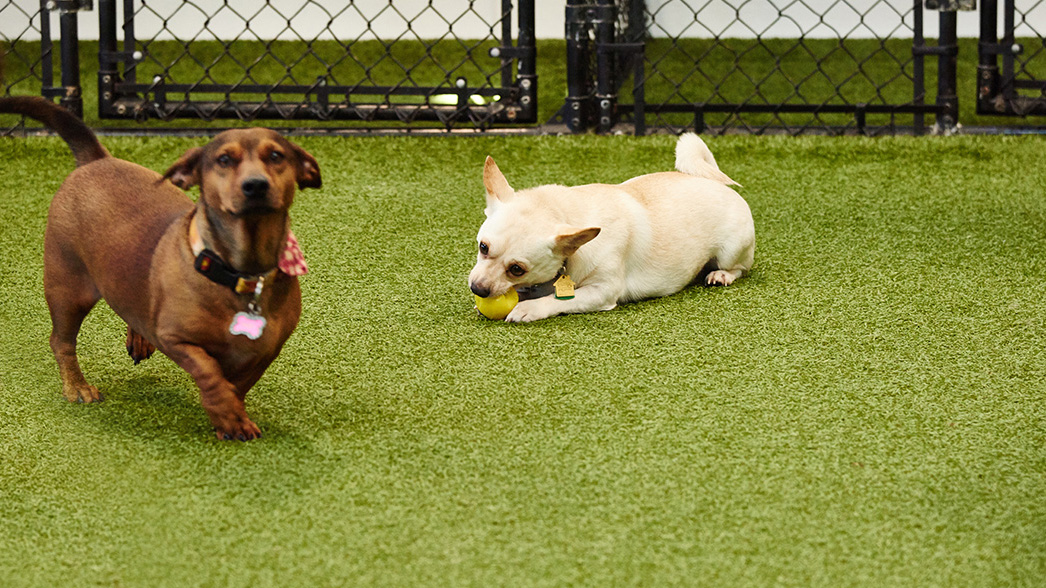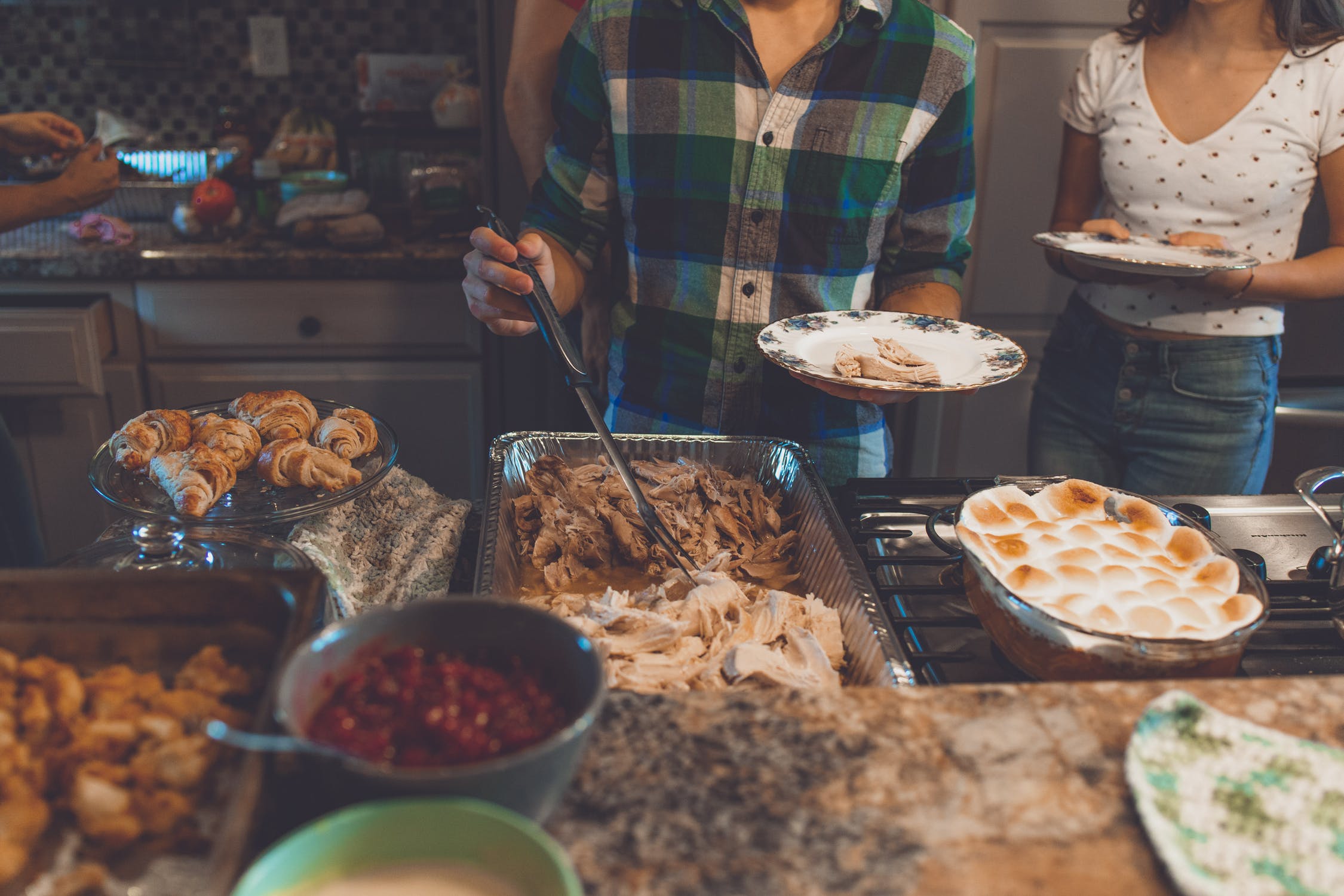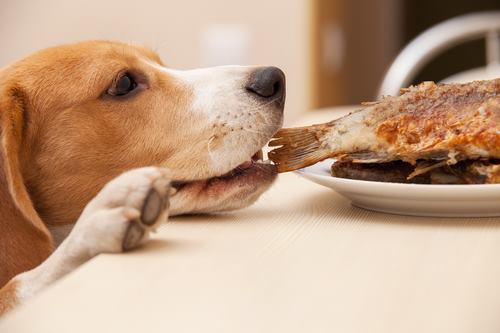
BLOG
THANKSGIVING & FIDO
Merritt Milam | October 31, 2019
Tips for a Happier, Healthier Holiday
Thanksgiving is a time for family, friends, and a feast of great food. Most parents and guests end up sharing (or sneaking) a tasty snack to a sweet, patiently watchful pet. It seems innocent enough…since they are part of the family. Unfortunately, allowing your pet to enjoy the Thanksgiving feast can have serious, even dangerous consequences. Here are some important food safety tips you need to know to keep your furry friend thankful for their health.

Harmful Foods Fido CAN’T Eat
- Onions and garlic (Stuffing) – Stuffing is a holiday tradition in most homes, but for pets it can be harmful. Any variety that contains garlic or onion (powdered, cooked, or raw) is lethal to dogs and most small animals. Consumption causes damage to the pet’s red blood cells and can ultimately lead to death.
- Mushrooms – Mushrooms can cause a variety of problems ranging from stomach upset to seizures depending on the kind of mushroom ingested.
- Raisins, Currants, Grapes – These fruits have been associated with liver and kidney failure.
- Cooked bones – Despite popular belief, cooked bones are hazardous to dogs. They can cause choking, stomach bleeding and intestinal blockages.
- Heavy fats like butter and turkey skin – The most common problem with fried food or items high in fat content is upset stomach and diarrhea. However, regular consumption can lead to heart disease and diabetes.
- Ham – Pork products can lead to pancreatitis, vomiting, and diarrhea in pets. Further, even small portions of fatty meat can cause obesity in smaller dogs and cats.
- Chocolate – While it seems like a simple treat, chocolate can be deadly to pets. An ingredient called theobromine is the trouble and can lead to vomiting, diarrhea, and seizures, as well as death.
- Alcohol – It should go without saying but, pets can suffer from alcohol ingestion. Even in small doses, intoxication can lead to seizures, respiratory failure, and death.
- Nuts – Macadamia nuts are just as lethal chocolate. Other nut varieties such as; cashews and walnuts aren’t as deadly as Macadamias, but they can still make your pet very sick.
- Raw bread dough – Raw bread expands in the stomach and can cause an intestinal blockage that can lead to death.
- Turkey – Unless the meat is totally plain, boneless and well-cooked, your pet should avoid turkey. Turkey that is raw or smothered in garlic, butter or seasonings, can be extremely toxic to your pet.
Foods Fido CAN Enjoy
- Sweet potatoes – Sweet potatoes are high in beta-carotene and fiber. Served ungarnished, though, sweet potatoes are perfectly fine, according to the ASPCA.
- Carrots – Carrots are low calorie and high in fiber and vitamin A. However, they are also high in sugar – so, you may want to skip them if your dog is diabetic. If carrots are chosen as a pet snack, steam or boil them and provide a couple of unseasoned ones to your furry friend.
- Green Beans – Green beans are filling and low calorie. Make sure you use fresh or frozen green beans with no seasoning.
- Cranberries – Cranberries are a great source of antioxidants and can add a fun burst of flavor to your dog’s plate. Not all dogs like cranberries so try adding just a few as a dessert or topping.
- Apple slices – Apples are a sweet treat for your pup. Save a few slices if you make apple pie and chop them up or mash them for your pup. Seeds and skin should be removed prior to serving to your pet.
- Pumpkin – Pumpkin can help regulate your dog’s digestive tract. Whether the pumpkin is steamed, baked, or canned make sure that nothing has been added to it.
Avoiding food illnesses in your pets is always important, but especially at this time of year when there are so many opportunities for them to be tempted and affected. Aside from making sure you and your guests keep unhealthy foods from your pet, there is another option to consider – Impulse Control training.

Whether your dog is a seasoned counter-surfer, garbage can crasher, or a persistent food beggar, this six-week course addresses impulse control issues in dogs, such as pulling towards distractions, jumping on guests, not coming when called, counter surfing, and refusing to leave things that aren’t theirs. Dogs will learn to settle and stay when guests knock at the door or ring the doorbell, and they will learn to leave distractions while on walks or when called to come. A strong emphasis is placed on offered behaviors, teaching the dog to make good decisions without being asked. Come, leave it, stay, and settle are delved into more deeply, through the use of new, innovative exercises.
If you are interested in learning more about training classes for your dog, call 205.902.WAGS (9247) or visit our website training page.
From all of us at Wags, we hope you and your family have a very safe and Happy Thanksgiving!
Sources: American Veterinary Medical Association, ASPCA, dvm360.com, PetPoisonHelpline.com


